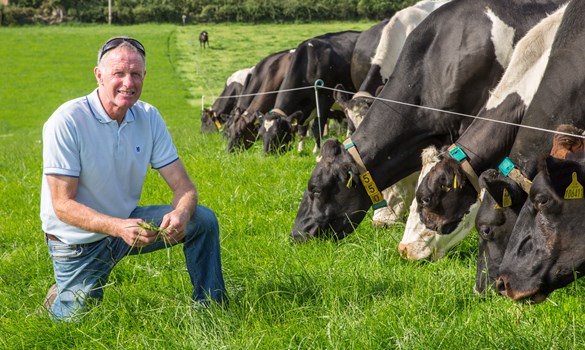Treating and managing Johnes
Join us on Wednesday, June 17th, 2020 where Karen Bond, Veterinary Technical Advisor at National Milk Records will discuss the pathology of Johne’s and cycles of infection.
Karen will be joined by Arthur Owen, an AHDB Strategic Dairy Farmer, who will share his experience of utilising the Johne’s Action Plan to reduce instances and mitigate risks in his herd.
Explore how to treat and mitigate risk against Johne’s disease, a chronic, debilitating and irreversible disease in cattle, affecting the lining of their intestines and reducing their capacity to absorb both fluid and nutrients.
This session aims to enable you spot the clinical signs of wasting or scour in your herd, especially those that are infected and only showing very mild if any signs of the disease.
Better understand the costs that are associated from increased susceptibility to other conditions, increased forced culling and the retention of cows that should otherwise be culled.
Who should attend?
- What is Johne’s disease?
- What are the routes of infection?
- Why do you get different results from the same cow?
- Why Johnes is important to your business?
- Evaluation of a Johne’s Management Plan from Arthur Owen.
Booking Details
Address: Online Webinar
Date: 17th June 2020
Time: 1:00 pm – 2.30 pm (may finish earlier if time not needed)
Register for your place at this online webinar today
For more information regarding the event please call Rachel Beasley, Knowledge Exchange Manager on 07776 660 810 or email Rachel.beasley@ahdb.org.uk
About Karen Bond – National Milk Laboratories
A graduate of Glasgow Veterinary School, Karen worked in a mixed practice then completed a three-year farm animal residency to obtain an MSc in livestock health and production. After a further year of research on Bovine TB at the Institute for Animal Health she returned to practice, working with dairy clients in Cheshire and Cumbria. Karen has also worked as a DairyCo technical extension officer. She is also completing her PhD at the Royal Veterinary College on Johne’s disease.
About Bodysgaw Isa
Bodysgaw Isa is a 185ha (457ac), all grass tenanted farm on the Cefn Estate. Farmed by the Owen family since 1939. The autumn block herd is comprised of 375 New Zealand type Friesian Crossbreds, producing 6,788L/cow and 568kg MS/cow. All cows calve down on grass, with low incidence rates of milk fever. Calving begins on 1st September, with 93% of cows calved within 8 weeks. Milk is sold through Arla.
Grazing platform of 103ha (255ac), aiming to graze February until late November. All replacements are home reared, with surplus livestock sold. The farm operates with minimal machinery and extensive use of contractors.
Over the next 3 years the challenges will be to fine-tune the business and profitably raise milk production from forage (grass and silage), control and reduce Johne’s and Neospora and upgrade slurry storage and utilisation.
Follow their journey by visiting www.ahdb.org.uk/farm-excellence/bodysgaw-isa or keep up to date with news on Twitter by using #SDFBodysgawIsa
About Strategic Dairy Farms
Strategic dairy farms help farmers learn from each other through regular on-farm meetings where we will share key performance data and showcase what the best farmers are doing. They form part of the Optimal Dairy Systems programme which aims to help dairy farmers lower costs and increase efficiency by focusing on either a block or an all-year-round calving system.
The growing network of strategic dairy farms has calculated key performance indicators (KPIs) for their enterprises which are shared at meetings and published online. These are physical and financial performance measures that are critical to success. Farmers can benchmark their businesses against these KPIs and identify areas for improvement.
Follow the programme and find other local SDFs at www.ahdb.org.uk/farm-excellence
This project has received funding through the Welsh Government Rural Communities - Rural Development Programme 2014-2020, which is funded by the European Agricultural Fund for Rural Development and the Welsh Government.
Topics:
Sectors:
If you have any questions about this event, please contact us using the details below.
T 07776 660810


